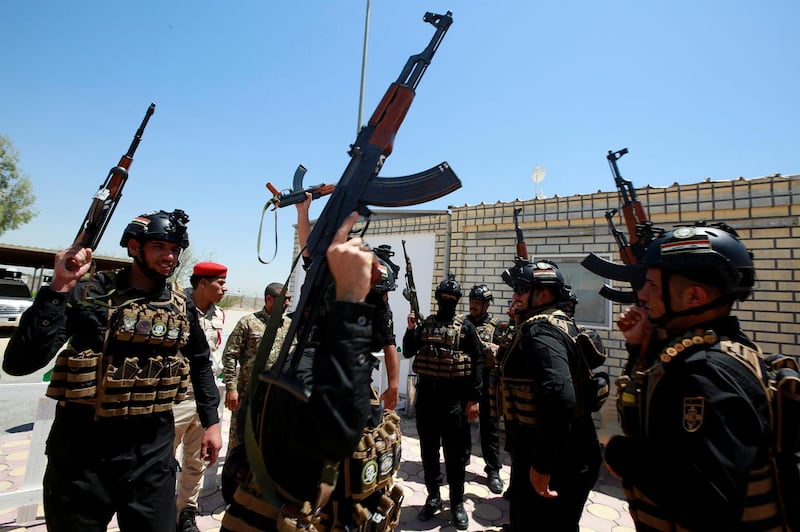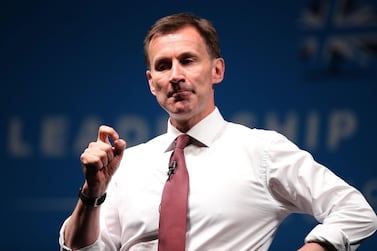The US imposed sanctions on two leaders of Iran-backed militias in Iraq on Thursday, calling them "perpetrators of serious human rights abuse and corruption".
Speaking at a US State Department conference on religious freedom, Vice President Mike Pence announced the new restrictions on two figures from the powerful Popular Mobilisation Forces, an umbrella of Iraqi militias.
Mr Pence said that Washington would "not stand idly by" while they "spread terror".
The US Treasury Department announced the sanctions under the Magnitsky Act, which allows for penalties against those breaching human rights.
Designated are two militia figures, Rayan Al Kildani and Waad Qado, and two former Iraqi governors, Nawfal Al Sultan and Ahmed Al Jubouri.
Al Kildani is the leader of the 50th Brigade Babylon militia and the US accused him of "serious human rights abuse", including cutting the ear off of a handcuffed prisoner.
"The 50th Brigade has systematically looted homes in Batnaya, which is struggling to recover from ISIS’s brutal rule,” the Treasury said.
Qado is the leader of the 30th Brigade militia, which the US says has collected money through extortion, illegal arrests and kidnappings.
Al Kildani is Christian and Qado is a member of the Shabak minority.
“The United States is taking action against four individuals in Iraq implicated in serious human rights abuse or corruption,” said Sigal Mandelker, Treasury undersecretary for terrorism and financial Intelligence.
“We will continue to hold accountable persons associated with serious human rights abuse, including persecution of religious minorities, and corrupt officials who exploit their positions of public trust to line their pockets and hoard power at the expense of their citizens.”
The new sanctions come after a rocket attack near the US embassy in Iraq in May and other incidents in the Gulf.
They have led to an escalation in tension between the US and Iran since US President Donald Trump withdrew America from a landmark nuclear deal with Tehran in May last year.
Mr Al Sultan is a former governor of Ninewa and was removed from office after a ferry accident in Mosul, which killed nearly 100 people.
“Iraqi authorities have issued an arrest warrant for the former governor, who fled shortly after the accident,” the Treasury said.
Mr Al Jubouri “also known as Abu Mazin, is a former governor of Salah Al Din, Iraq, and current member of Parliament who has engaged in corruption".
"He was removed as governor and sentenced to prison in July 2017 upon conviction for misusing authority and federal funds, and appropriating land for personal use”. But he was then released.
“Al Jubouri has been known to protect his personal interests by accommodating Iran-backed proxies that operate outside state control,” the Treasury read.
It said the "corruption and abuse-related actions committed by these sanctioned individuals occurred in areas where persecuted religious communities are struggling to recover from the horrors inflicted on them by ISIS".
Analysts have described the forces led by Al Kildani and Qado as rogue militias engaged in illegal activities.
"The 30th and 50th brigades do not want to follow orders from the Iraqi prime minister and nor do they want to give up lucrative opportunities and Mafiosi-like power at the local level," Iraq expert and senior fellow of The Washington Institute Michael Knights wrote in July.
And if the US is going to start sanctioning Iraqi politicians for being corrupt, frankly I don't think there would be very many who could not be a target. Virtually the entire political class could in principle be targeted.
— Kirk H. Sowell (@UticaRisk) July 18, 2019
But sanctioning of more mainstream politicians such as Mr Al Jubouri and Mr Al Sultan is significant, Kirk Sowell, an Iraq expert at Utica Risk Services, wrote on Twitter.
"I find this to be really huge because previously sanctioned Iraqis were out-and-out militiamen," Mr Sowell wrote.
"If the US is going to start sanctioning Iraqi politicians for being corrupt, frankly I don't think there would be very many who could not be a target.
"Virtually the entire political class could, in principle, be targeted."






